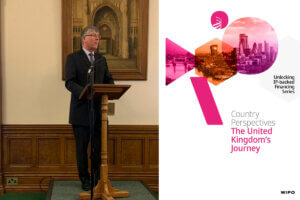Martin Brassell, Chief Executive of Inngot, argues for a re-evaluation of how we treat Intellectual Property and other intangible assets in the funding process
In recent days, like many of us, I have been reflecting on the situation facing many businesses seeking finance as a result of the pandemic.
Recent press coverage highlighting requests for personal guarantees (are they required? are they not required?) or for other forms of asset-backed collateral suggests to me that this would be a good time to learn some lessons from 2008/9.
There are a few important things I feel we know – or should know – about assets. Here are three of them:
Firstly, context matters. Take an example one bank CEO gave me a while back. A business wants to buy a fancy coffee machine. If it’s a coffee shop, that’s fine, it’ll be used to generate cash, the business will be dependent on it, so won’t default on payments if they can possibly avoid it. But what if it is a car dealership
Secondly, just because some assets (like property) are regularly traded, that doesn’t make them entirely trustworthy. That’s because they behave like commodities – they float or sink together. In the good times, they can be bought and sold predictably, but when disaster strikes (like now), they become illiquid with no warning. You could then be stuck with them for a long time, because even when conditions improve, you can’t offload them without depressing prices.
Thirdly, you need a clear line of sight to the actual asset. 2008’s ‘castle’ of derivatives and securities was built on the ‘sand’ of low-quality debt secured against overvalued real estate. Who knew – or cared enough – until it was too late?
From these three observations, three lessons follow:
1. Business value that customers recognise lies in what makes a product or service different, not the things that make it the same. The assets that make the best security are those which support the delivery of that difference. Anything else is peripheral and potentially dispensable.
2. Even where commercial property is available, it is not a safe bet. And if this is true of direct asset-backed lending, it also means that personal guarantees (PGs) offer false comfort, because they too ultimately dependent on property prices. And in any event, do lenders really want to be in the business of evicting their customers? Only as an absolute last resort: it’s very bad PR.
3. Chickens have a habit of coming home to roost. Bad lending decisions now will have future consequences. So it is right to ask questions when lending money. They just have to be the right questions.
If these lessons are right – and I’m fairly confident about all three of them – why didn’t credit policy and practice both change following 2008/9? Well, they did, but I would submit not by much, and not in ways that help us now.
Debt serviceability criteria tightened, suppressing demand and slowing economic growth (and leading to increased use of PGs). More worryingly, the (entirely necessary and appropriate) drive to strengthen bank balance sheets has just ended up increasing lender dependency on traditional assets – especially property. So loans are even less well aligned with the real drivers of business value than they were before the last crash.
Amongst all the speculation about what the ‘new normal’ will be like, we need to resolve this over-reliance on the wrong kind of assets, so that responsible lending can properly drive the economy out of where it finds itself now.
That means taking good quality knowledge assets seriously, because they are unique. They’re also the primary focus for company investment, and core to product and service delivery. Best of all, they are not commodities, meaning that one company’s risk is uncorrelated with another.
We will make this happen. Watch this space…







